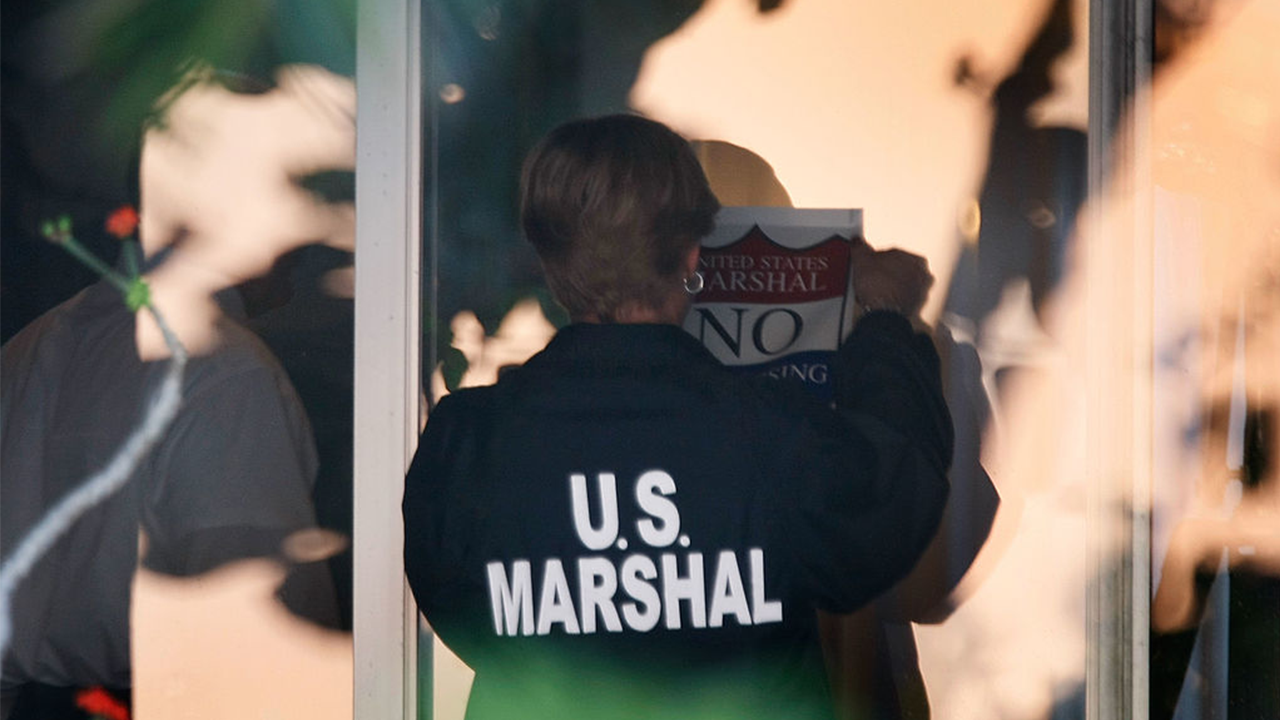New Jersey
New Jersey woman arrested, jailed over mistaken identity cannot sue due to qualified immunity, court rules

A New Jersey woman who was arrested and spent two weeks behind bars over a mistaken identity cannot sue the U.S. marshals who arrested her because they are protected by qualified immunity, a court ruled.
Judith Maureen Henry was booked into the Essex County Correctional Facility in Newark in 2019 after the marshals detained her, mistakenly believing she was another woman with the same name who pleaded guilty to drug possession and skipped her parole in Pennsylvania in 1993.
Henry sought to sue the marshals over the mistake, but a three-judge appellate panel ruled Thursday that the marshals acted on a “constitutionally valid” warrant and were protected by qualified immunity, which shields law enforcement from liability for wrongdoing.
“Their arrest of Henry relying on information attached to the warrant was a reasonable mistake, and therefore her arrest did not violate the Fourth Amendment,” Judge Thomas Ambro of the U.S. Third Circuit Court of Appeals wrote in the ruling, according to the New Jersey Monitor.
WOMAN RUN OVER BY POLICE OFFICER WHILE SUNBATHING AT NEW JERSEY BEACH: POLICE
A court ruled that Judith Maureen Henry, who was arrested and jailed over a mistaken identity, cannot sue the U.S. marshals who arrested her because they are protected by qualified immunity. (Getty Images)
Henry repeatedly told marshals during her 2019 arrest that she was not the person they were after and asked them to compare her fingerprints to those of the actual offender. But nobody compared the fingerprints until 10 days after her arrest, when she was transferred to Pennsylvania, and she remained locked up for another few days before she was finally released.
“Henry’s complaint — that the Marshals failed to take her claims of innocence seriously — raises a host of policy questions about the role of the Marshals Service after they apprehend a suspect on a warrant for a crime they did not investigate,” Ambro wrote.
The judge said those questions include how strong a claim of innocence must be before a marshal investigates, who should investigate and how thorough an investigation should be conducted. He said a reasonable observer could conclude the answers to these questions would be easy to find and would impose “minimal burdens” on the marshals.

Marshals mistook Judith Maureen Henry for another woman with the same name who pleaded guilty to drug possession and skipped her parole in Pennsylvania in 1993. (iStock)
But, Ambro wrote, those policy questions should be up to lawmakers to address.
He also noted that the marshals were not involved in Henry’s continued detention.
The court also rejected allegations from Henry, who is black and from Jamaica, that she faced this treatment due to her race, sex, national origin and lower economic status.
“We need not accept this bare conclusion, and she offers no other allegations to support it,” Ambro wrote.
WARNING FROM WILDLIFE OFFICIALS ABOUT VENOMOUS SNAKE IN NEW JERSEY: ‘NEVER TOUCH IT’

An appellate panel ruled that the marshals were protected by qualified immunity, which shields law enforcement from liability for wrongdoing. (Getty Images )
CLICK HERE TO GET THE FOX NEWS APP
A district judge had refused the marshals’ request to dismiss Henry’s lawsuit against them, but Ambro reversed that ruling and ordered the judge to drop the marshals from the lawsuit.
Outside the marshals, Henry’s lawsuit named Essex County and about 30 law enforcement officers and government officials in New Jersey and Pennsylvania as defendants, accusing them of abuse of process, false arrest and imprisonment, intentional infliction of emotional distress, failure to train and supervise and conspiracy.

New Jersey
New Jersey weighs making underage gambling no longer a crime

TRENTON (AP) — Should underage gambling no longer be a crime?
New Jersey lawmakers are considering changing the law to make gambling by people under the age of 21 no longer punishable under criminal law, making it subject to a fine.
It also would impose fines on anyone helping an underage person gamble in New Jersey.
The bill changes the penalties for underage gambling from that of a disorderly persons offense to a civil offense. Fines would be $500 for a first offense, $1,000 for a second offense, and $2,000 for any subsequent offenses.
The money would be used for prevention, education, and treatment programs for compulsive gambling, such as those provided by the Council on Compulsive Gambling of New Jersey.
Atlantic city waterline aerial
“The concern I had initially was about reducing the severity of the punishment,” said Assemblyman Don Guardian, a Republican former mayor of Atlantic City. “But the fact that all the money will go to problem gambling treatment programs changed my mind.”
Figures on underage gambling cases were not immediately available Thursday. But numerous people involved in gambling treatment and recovery say a growing number of young people are becoming involved in gambling, particularly sports betting as the activity spreads around the country.
The bill was approved by an Assembly committee and now goes to the full Assembly for a vote. It must pass both houses of the Legislature before going to the desk of the state’s Democratic governor, Phil Murphy.
The council said recently that it conditionally supports the bill but has concerns about it.
SEE ALSO: Hostile takeover of NJ police department is illegal, court rules
Caesars Atlantic City (Google Street View)
Luis Del Orbe, the council’s acting executive director, said he is glad it will provide funding for gambling treatment and education programs. But he said fines alone are not enough without mandating education about problem gambling. He asked that such a requirement be added to the bill.
“When a young person is ‘fined,’ who actually pays the fine?” he asked.
In a statement submitted to the Assembly panel, the council said, “More and more of New Jersey citizens need help due to the ongoing expansion of gambling opportunities, and it is anticipated that the demand will only continue to grow. There is also an urgent need for expanded education and awareness about the harms that can come of gambling, particularly with respect to youth.”
Report a correction 👈 | 👉 Contact our newsroom
21 top spots to take a first-time visitor to New Jersey
Someone from out-of-state, or maybe even out of the country, is visiting New Jersey for the first time. Where do you take them? After grabbing a bagel and before chowing down on a slice of Jersey pizza, be sure to treat your out-of-town guest to a day in the Garden State with some of these places in mind.
Gallery Credit: Jen Ursillo
NJ’s wealthiest ZIP codes in 2024
These are the 10 most expensive ZIP codes in New Jersey, based on the median sale prices of homes, according to PropertyShark.
Gallery Credit: Dino Flammia
Celebrities who vowed to leave the United States after the election
Rumors are flying that Bruce Springsteen has vowed to leave the country if Donald Trump wins the 2024 election. He didn’t say it.
But false promises of leaving the country if a celebrity didn’t get their way has been a real thing and not always said in jest.
Here’s a list of famous people who promised to leave the country if Trump were elected. I hope you didn’t bet money on them leaving since none did.
Gallery Credit: Jeff Deminski
New Jersey
New Jersey State Police Gave a ‘Free Pass’ to Motorists with Courtesy Cards or Ties to Police, Investigation Finds – Insider NJ

The Office of the State Comptroller found even motorists suspected of dangerous driving offenses were let go by New Jersey State Police.
TRENTON—An investigation finds that New Jersey State Police troopers routinely gave preferential treatment to certain motorists who presented a courtesy card or asserted a personal connection to law enforcement—even when motorists were suspected of dangerous offenses, like drunk driving, according to a new report by the New Jersey Office of the State Comptroller.
OSC’s Police Accountability Project reviewed body worn camera footage of 501 no-enforcement stops by New Jersey State Police–meaning stops where New Jersey State troopers did not issue tickets or make arrests. In 139 or 27 percent of these no-enforcement stops, motorists presented a courtesy card, claimed to have a friend or relative in law enforcement, or flashed a law enforcement badge and then were let go, OSC’s report said. In some cases, the trooper released the motorist immediately, offering some version of “you’re good.” The report found that courtesy cards are in wide usage and function as “accepted currency” by state troopers. (In all but one case, the troopers gave the courtesy card back to the motorist, enabling the card to be used again.)
Reviewing more than 50 hours of body worn camera footage of the stops, which took place over ten days in December 2022, OSC found that troopers regularly decided not to enforce motor vehicle laws after receiving a courtesy card or being told the driver has ties to law enforcement. For instance, one motorist, who was stopped for driving over 90 miles per hour, admitted to drinking alcohol but was let go without a sobriety test after he presented two courtesy cards. Another motorist was stopped for driving over 103 miles per hour and was released after she volunteered that her father was a lieutenant in a local police department. The most significant consequence the troopers imposed in these stops was advising the motorists that they had left a voicemail message for the law enforcement officer named on the courtesy card or invoked as a friend or relative. OSC has released video excerpts of the footage.
“Our investigation shows that some people are being given a free pass to violate serious traffic safety laws,” said Acting State Comptroller Kevin Walsh. “Law enforcement decisions should never depend on who you know, your family connections, or donations to police unions. Nepotism and favoritism undermine our laws and make our roads more dangerous.”
Overall, close to half of the 501 non-enforcement stops reviewed by OSC involved speeding, many for more than 20 miles per hour over the speed limit. In three stops, drivers stopped for reckless driving, careless driving, and/or speeding, also admitted to drinking alcohol, yet were released without being asked to step out of the car for a field sobriety test. Both drunk driving and speeding are major causes of traffic fatalities. According to data compiled by the New Jersey State Police Fatal Accident Investigation Unit, in 2022, New Jersey recorded 646 fatal collisions that resulted in 689 deaths or 1.89 fatalities per day. This was among the highest number of traffic-related deaths in New Jersey in the past 15 years.
OSC initiated this investigation in response to reports that law enforcement officers’ decisions not to enforce motor vehicle violations were influenced by improper factors, including courtesy cards. Courtesy cards, often referred to as PBA cards, FOP cards, or gold cards, are given out by police labor associations to law enforcement officers. They also can be purchased through “associate memberships” with police associations and are sold by private companies.
OSC’s investigation found that courtesy cards are widely used. In 87, or 17 percent, of the no-enforcement stops OSC reviewed, motorists presented courtesy cards that came from municipal police departments, county and state agencies, as well as inter-state and out-of-state law enforcement agencies. They all appeared to be equally effective at getting motorists released without enforcement.
Asserting a relationship with law enforcement appeared to carry equal weight, OSC found. In 52 or 10 percent of the no-enforcement stops reviewed, the driver or passengers did not present a courtesy card but claimed a connection to law enforcement, and the trooper decided to let them go. In 29 of those stops, the motorist or passenger identified themselves as current, retired, or in-training law enforcement officers. Other stops resulted in no enforcement when the drivers or passengers claimed a relative, friend, or neighbor worked in a law enforcement agency.
In one stop, a trooper said he stopped a motorist for driving 97 miles per hour. After an extended conversation about the “friends” they had in common, the trooper told the driver to “stay safe” and let him go. In another stop, a trooper performed a computerized look-up of the driver’s credentials and discovered the driver had an active warrant for his arrest. But when the driver’s friend introduced himself, letting the trooper know that he was also an off-duty trooper, the stopping trooper walked back to the motorist, apologized for stopping him, and let him go without even mentioning the warrant. OSC was unable to determine from the footage what the warrant was for.
Other findings include:
- Providing preferential treatment to motorists who present courtesy cards or assert close personal relationships with law enforcement appears to have a discriminatory impact. Of the 87 courtesy cards observed in the sample, for instance, 69 were presented by White drivers.
- Even when courtesy cards were not present, racial disparities were observed in the sample. New Jersey State Police policy requires troopers to request all three driving credentials (license, registration, proof of insurance) when making motor vehicle stops, but OSC found overall, White and Asian drivers were less likely to have all three of their credentials requested and verified when compared to Black and Hispanic/LatinX drivers. Additionally, troopers conducted computerized lookups of Hispanic/LatinX drivers 65 percent of the time, while looking up White drivers only 34 percent of the time.
- In many stops, OSC was unable to ascertain why the troopers made the decision not to enforce motor vehicle violations because of the quality of the video footage or other factors. Still, OSC observed several of those stops involved dangerous offenses, underscoring the importance of reviewing no-enforcement motor vehicle stops, which are not routinely reviewed.
OSC made 11 recommendations, including that New Jersey State Police regularly review no-enforcement stops to better understand racial/ethnic trends in motor vehicle data and determine if additional training is needed. OSC also recommended that the Attorney General consider issuing a directive that would explicitly prohibit law enforcement officers from giving preferential treatment to motorists because of their ties to law enforcement or possession of courtesy cards.
Read the report.
Watch excerpts of the body camera footage.
Sign up now for OSC’s newsletter.
New Jersey
Authorities Debunk Viral Explanation for NJ Drone Sightings

The drones spotted over the Garden State were probably not looking for a missing shipment of radioactive material.
-

 Business1 week ago
Business1 week agoOpenAI's controversial Sora is finally launching today. Will it truly disrupt Hollywood?
-

 Politics5 days ago
Politics5 days agoCanadian premier threatens to cut off energy imports to US if Trump imposes tariff on country
-
/cdn.vox-cdn.com/uploads/chorus_asset/file/25782636/247422_ChatGPT_anniversary_CVirginia.jpg)
/cdn.vox-cdn.com/uploads/chorus_asset/file/25782636/247422_ChatGPT_anniversary_CVirginia.jpg) Technology7 days ago
Technology7 days agoInside the launch — and future — of ChatGPT
-
/cdn.vox-cdn.com/uploads/chorus_asset/file/25789444/1258459915.jpg)
/cdn.vox-cdn.com/uploads/chorus_asset/file/25789444/1258459915.jpg) Technology5 days ago
Technology5 days agoOpenAI cofounder Ilya Sutskever says the way AI is built is about to change
-

 Politics5 days ago
Politics5 days agoU.S. Supreme Court will decide if oil industry may sue to block California's zero-emissions goal
-
/cdn.vox-cdn.com/uploads/chorus_asset/file/25546252/STK169_Mark_Zuckerburg_CVIRGINIA_D.jpg)
/cdn.vox-cdn.com/uploads/chorus_asset/file/25546252/STK169_Mark_Zuckerburg_CVIRGINIA_D.jpg) Technology5 days ago
Technology5 days agoMeta asks the US government to block OpenAI’s switch to a for-profit
-

 Politics6 days ago
Politics6 days agoConservative group debuts major ad buy in key senators' states as 'soft appeal' for Hegseth, Gabbard, Patel
-

 Business3 days ago
Business3 days agoFreddie Freeman's World Series walk-off grand slam baseball sells at auction for $1.56 million




















